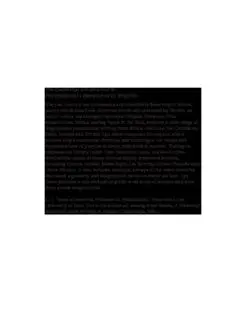
The Cambridge Introduction to Postcolonial Literatures in English (Cambridge Introductions to Literature) PDF
Preview The Cambridge Introduction to Postcolonial Literatures in English (Cambridge Introductions to Literature)
TheCambridgeIntroductionto Postcolonial Literatures in English Thepastcenturyhaswitnessedanextraordinaryfloweringoffiction, poetryanddramafromcountriespreviouslycolonisedbyBritain,an outputwhichhaschangedthemapofEnglishliterature.This introduction,fromaleadingfigureinthefield,exploresawiderangeof AnglophonepostcolonialwritingfromAfrica,Australia,theCaribbean, India,IrelandandBritain.LynInnescomparesthewaysinwhich authorsshapecommunalidentitiesandinterrogatethevaluesand representationsofpeoplesinnewlyindependentnations.Placingits emphasisonliteraryratherthantheoreticaltexts,thisbookoffers detaileddiscussionofmanyinternationallyrenownedauthors, includingChinuaAchebe,JamesJoyce,LesMurray,SalmanRushdieand DerekWalcott.Italsoincludeshistoricalsurveysofthemaincountries discussed,aglossary,andbiographicalnotesonmajorauthors.Lyn Innesprovidesarichandsubtleguidetoanarrayofauthorsandtexts fromawiderangeofsites. C.L.InnesisEmeritusProfessorofPostcolonialLiteraturesatthe UniversityofKent.Sheistheauthorof,amongotherbooks,AHistoryof BlackandAsianWritinginBritain(Cambridge,2002). Cambridge Introductions to Literature Thisseriesisdesignedtointroducestudentstokeytopicsandauthors. Accessibleandlively,theseintroductionswillalsoappealtoreaderswho wanttobroadentheirunderstandingofthebooksandauthorstheyenjoy. (cid:1) Idealforstudents,teachers,andlecturers (cid:1) Concise,yetpackedwithessentialinformation (cid:1) Keysuggestionsforfurtherreading Titlesinthisseries: ChristopherBalme TheCambridgeIntroductiontoTheatreStudies EricBulson TheCambridgeIntroductiontoJamesJoyce WarrenChernaik TheCambridgeIntroductiontoShakespeare’sHistoryPlays JohnXirosCooper TheCambridgeIntroductiontoT.S.Eliot PatrickCorcoran TheCambridgeIntroductiontoFrancophoneLiterature GreggCrane TheCambridgeIntroductiontoTheNineteenth-CenturyAmerican Novel KirkCurnutt TheCambridgeIntroductiontoF.ScottFitzgerald JanetteDillon TheCambridgeIntroductiontoEarlyEnglishTheatre JanetteDillon TheCambridgeCompaniontoShakespeare’sTragedies JaneGoldman TheCambridgeIntroductiontoVirginiaWoolf KevinJ.Hayes TheCambridgeIntroductiontoHermanMelville NancyHenry TheCambridgeIntroductiontoGeorgeEliot DavidHoldeman TheCambridgeIntroductiontoW.B.Yeats C.L.Innes TheCambridgeIntroductiontoPostcolonialLiteraturesinEnglish M.JimmieKillingsworth TheCambridgeIntroductiontoWaltWhitman PericlesLewis TheCambridgeIntroductiontoModernism RonanMcDonald TheCambridgeIntroductiontoSamuelBeckett WendyMartin TheCambridgeIntroductiontoEmilyDickinson PeterMessent TheCambridgeIntroductiontoMarkTwain DavidMorley TheCambridgeIntroductiontoCreativeWriting IraNadel TheCambridgeIntroductiontoEzraPound LelandS.Person TheCambridgeIntroductiontoNathanielHawthorne JohnPeters TheCambridgeIntroductiontoJosephConrad SarahRobbins TheCambridgeIntroductiontoHarrietBeecherStowe MartinScofield TheCambridgeIntroductiontotheAmericanShortStory EmmaSmith TheCambridgeIntroductiontoShakespeare PeterThomson TheCambridgeIntroductiontoEnglishTheatre,1660–1900 JanetTodd TheCambridgeIntroductiontoJaneAusten JenniferWallace TheCambridgeIntroductiontoTragedy The Cambridge Introduction to Postcolonial Literatures in English C. L. INNES cambridge university press Cambridge,NewYork,Melbourne,Madrid,CapeTown,Singapore,Sa˜oPaulo,Delhi CambridgeUniversityPress TheEdinburghBuilding,CambridgeCB28RU,UK PublishedintheUnitedStatesofAmericabyCambridgeUniversityPress,NewYork www.cambridge.org Informationonthistitle:www.cambridge.org/9780521541015 (cid:1)C C.L.Innes2007 Thispublicaionisincopyright.Subjecttostatutoryexception andtotheprovisionsofrelevantcollectivelicensingagreements, noreproductionofanypartmaytakeplacewithout thewrittenpermissionofCambridgeUniversityPress. Firstpublished2007 PrintedintheUnitedKingdomattheUniversityPress,Cambridge AcataloguerecordforthispublicationisavailablefromtheBritishLibrary LibraryofCongressCataloguinginPublicationdata Innes,CatherineLynette. TheCambridgeintroductiontopostcolonialliteraturesinEnglish/C.L.Innes. p. cm.–(Cambridgeintroductionstoliterature) Includesbibliographicalreferences. ISBN978-0-521-83340-0(hardback)–ISBN978-0-521-54101-5(pbk.) 1.Commonwealthliterature(English)–Historyandcriticism. 2.Postcolonialismin literature. 3.Coloniesinliterature. I.Title. II.Series PR9080.I55 2007 820.9–dc22 2007032988 ISBN978-0-521-83340-0hardback ISBN978-0-521-54101-5paperback CambridgeUniversityPresshasnoresponsibilityforthepersistenceoraccuracyofURLs forexternalorthird-partyinternetwebsitesreferredtointhispublication,anddoesnot guaranteethatanycontentonsuchwebsitesis,orwillremain,accurateorappropriate. Contents Preface page vii Chapter1 Introduction:situatingthe postcolonial 1 Chapter2 Postcolonialissuesinperformance 19 Chapter3 Alternativehistoriesandwritingback 37 Chapter4 Authorizingtheself:postcolonial autobiographicalwriting 56 Chapter5 Situatingtheself:landscapeandplace 72 Chapter6 Appropriatingtheword:language andvoice 97 Chapter7 Narratingthenation:formand genre 119 Chapter8 Rewritingherstory:nationand gender 137 Chapter9 Rewritingthenation:acknowledging economicandculturaldiversity 161 Chapter10 TransnationalandblackBritish writing:colonizinginreverse 177 Chapter11 Citizensoftheworld:reading postcolonialliterature 197 Notes 209 Glossaryoftermsused(compiledbyKaoriNagai) 233 v vi Contents Biographiesofselectedpostcolonialwriters(compiled byKaoriNagai) 242 Briefcolonialhistories:Australia,theCaribbean,East Africa,IndiaandPakistan,Ireland,WestAfrica (compiledbyKaoriNagai) 265 Selectbibliography 274 Index 289 Preface Thisbooksetsouttoconsidersomeofthewritingthathasemergedduringthe pastcenturyfromthenumerousandcomplexrangeofpostcolonialsocieties whichwereformerlypartoftheBritishEmpire.Itseeksnotonlytodiscussthe authorsandtexts,butalsotoraisequestionsaboutthewaysinwhichtheyhave been thought about under the aegis of postcolonial studies, and to ask what varyingmeaningspostcolonialliteraturemayhaveindifferentcontexts. Inthefirstdecadesofthetwentiethcentury,Europeanstatesgovernedmore than80percentoftheworld’sterritoriesandpeople.OfthesetheBritishEmpire wasthemostextensiveandpowerful,claimingasBritishsubjectsapopulation ofbetween470and570millionpeople,approximately25percentoftheworld’s population, and laying claim to more than ninety territories in Africa, Asia, Europe,NorthAmerica,theCaribbean,AustralasiaandthePacific.Almostall thoseterritorieshavenowevolvedand/orcombinedintoindependentstates, fifty-threeofwhichconstitutethe‘British’Commonwealth,avoluntaryorga- nization which several former colonies such as Burma, Egypt, Ireland, and Iraqdeclinedtojoinwhentheygainedindependence.1 To a greater or lesser degree,alltheseterritoriessharedahistoryofculturalcolonialism,including theimpositionoftheEnglishlanguage,andBritisheducational,politicaland religiousinstitutions,aswellaseconomicrelationshipsandsystems. Within the context of postcolonial writing, critics have often quoted Cal- iban’sretorttoProsperoinTheTempest:‘Yougavemelanguage,andmyprofit on’t/IsIknowhowtocurse.’2Perhapslessfrequentlyquoted,butevenmore significant,arethelineswhichdisplayCaliban’seloquence(intheEnglishlan- guage)whenitcomestodescribingtheislandProsperohastakenfromhim, withacombinationofforce,magicandtheseductionsofnewlearning: Benotafeard;theisleisfullofnoises, Soundsandsweetairs,thatdelightandhurtnot. Sometimesathousandtwanginginstruments Willhumaboutmineears;andsometimesvoices3 vii viii Preface AsGeorgeLammingcommented,‘ProsperohadgivenCalibanLanguage;and with it an unstated history of consequences, and unknown history of future intentions.’4 Thus one major and unintended consequence of British colonialism has beenanenormousfloweringofliteratureinEnglishbypostcolonialauthors, presentingthestoryofcolonialismanditsconsequencesfromtheirperspective, andreclaimingtheirlandandexperiencethroughfiction,dramaandpoetry,a representationandreclamationrequiringareinventionoftheEnglishlanguage andEnglishliterarytraditions. Thisbookcannotattempttoencompassthemanyliterarytextsandcultures thatareanimportantfeatureoftheanglophonepostcolonialworld.Evento try to acknowledge half of those ninety territories or former colonies would result in superficial lists of authors and a blurring of the qualities and issues specifictodifferentcolonialandpostcolonialhistoriesandculturalcontexts. Hence,althoughtherewillbeoccasionalreferencetowritersfromothercoun- triessuchasCanada,theRepublicofSouthAfrica,SriLankaandZimbabwe, thisbookwillconcentrateonworksfromjustafewformercolonies,chosen as examples of particular kinds of colonial and postcolonial structures and traditions. These include Ireland, as England’s oldest colony and the testing groundformanyofherlatercolonialpolicies.Moreimportantlyforthisstudy, Ireland’sliteraryrevivalisacknowledgedbymanypostcolonialwritersinother countries as a model for their own construction of a national literature. In addition to Ireland, I have chosen India and West Africa (specifically Ghana andNigeria)asexamplesofformercoloniesadministeredbyindirectrulebut withverydifferentindigenouscultures.KenyaandTanzania,withtheirvaried indigenouspopulationstogetherwithahistoryofwhitesettlementandoccu- pation of farming land, as well as immigrants from the Indian subcontinent andtheMiddleEast,provideexamplesofsettlercoloniesinAfricawithamul- ticulturalhistoryandpopulation.Australiarepresentsapredominantlywhite settlercolonyandpostcolonywhoseidentityinvolvesnotonlytwocenturiesof developmentandattachmenttoanaturalworldperceivedasalmostthereverse ofBritain’s,butalsoitsoriginsasaconvictsettlement,anditshistoryofbru- taldispossessionofthecontinent’sAboriginalpeoples.TheCaribbeanislands ofJamaica,StLuciaandTrinidadprovidehistoriesofenforcedimmigration, enslavementandacculturation,whereoriginallanguagesandtraditionswere eithersubmergedand/ormaskedandtransformed.Finally,thediasporiccom- munitiesincontemporaryBritainfromformercoloniesprovideanotherpoint of departure for contrast and comparison with Caribbean and other multi- culturalorinterculturalsocieties.AnAppendixprovidesbriefhistoriesofthe selectedareastohelporientreaders. Preface ix These histories have been compiled with considerable assistance from Dr KaoriNagai,whosecarefulresearchandkeenintelligencehavealsocontributed tothebiographicalentriesforthemainauthorsdiscussed,andtheglossaryof terms. I also wish to acknowledge the contributions of many undergradu- ate and postgraduate students at Tuskegee Institute, Cornell University, the UniversityofMassachussets,andtheUniversityofKent,whosevariedenthu- siasmsandquestionshaveinformedmyteachingandwritingovertheyears. Thisbookhasbenefitedfrominsightsandnewmaterialbroughttomyatten- tionbyformerpostgraduatestudentsandIwishparticularlytoacknowledge Maggie Bowers, Sarah Chetin, Paul Delaney, Eugene McNulty, Kaori Nagai, ElodieRousselot,FlorianStadtler,AmySmith,MarkStein,MonicaTurci,and AnastasiaVassalopoulos.PastandpresentcolleaguesattheUniversityofKent andelsewheretowhomIoweaparticulardebtincludeSamuelAllen,Ashok Bery,EllekeBoehmer,DenisedeCairesNarain,RodEdmond,AbdulrazakGur- nah,LouisJames,DeclanKiberd,SusheilaNasta,StephanieNewell,Caroline Rooney,JoeSkerrett,AngelaSmith,DennisWalderandmyhusband,Martin Scofield.TobiasDo¨ring’sthoughtfulcommentsonthedraftmanuscripthave beenexceptionallyhelpful,ashavebeenhisownpublications. Sectionsofthisbookhaveappearedpreviouslyindifferentversionsasjournal essaysorchaptersinbooks.Sincetheyfirstappeared,theyhavebeenconsider- ablyrevised,updatedandelaboratedwithindifferentcontexts.Iacknowledge their publication in earlier form and express my thanks to the editors and publishersofthefollowing: HowardBoothandNigelRigby,eds.,ModernismandEmpire(Manchester: ManchesterUniversityPress,2000). ClaraA.B.JosephandJanetWilson,eds.,GlobalFissures:PostcolonialFusions (AmsterdamandNewYork:Rodopi,2006). Tobias Do¨ring, ed., A History of Postcolonial Fiction in Twelve and a Half Books(Trier:WVT,Wiss.Verl.Trier,2006).
